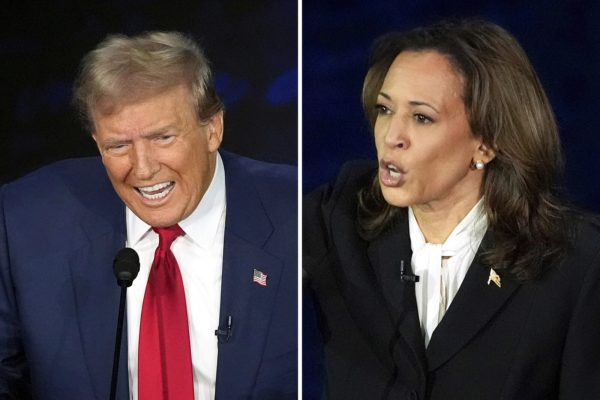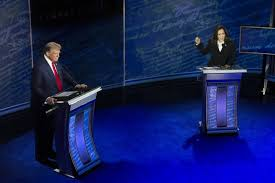
Philadelphia – On Sept. 10, 2024, the world watched carefully as former President Donald Trump and Vice President Kamala Harris held their first debate at the National Constitution Center. After President Joseph Biden suspended his campaign less than a month after the first debate of the election cycle against the GOP nominee, the content and effects of this latest debate are a topic of scrutiny for those whose interests lie in the future of the United States of America.
The final rules of the debate were fundamentally the same as the debate on June 27, 2024, except for one critical factor: microphones. While Biden’s campaign requested muted microphones in the first debate between Biden and Trump, Harris’s campaign asked to remove the feature for the Harris and Trump debate. They claimed it was to better fit the format of Harris’ previous occupation as a prosecutor and not to shield Trump from direct exchanges. The questions asked by the moderators were kept hidden from either party beforehand, and the candidates were not permitted to meet with their campaign staff during the two allotted commercial breaks. The American Broadcasting Company (ABC) hosted the debate, with journalists David Muir and Linsey Davis as the moderators.
The debate began with Muir asking Harris a question that has become synonymous with Trump’s interactions with his supporters: “When it comes to the economy, do you believe Americans are better off than they were four years ago?” The economy has remained a large concern for Americans. Prices from the gas station to the grocery store have seen massive increases in the last four years. However, we’ve seen a slow but steady decrease in the Consumer Price Index according to the U.S. Bureau of Labor as the election approaches this November.
Harris responded to the question by explaining her plan for the economy instead of answering the question, narrating her origins in a middle-class family with a single Indian-American mother and conveying her understanding of the current economic situation of the middle class. Harris proposed a $6,000 tax cut for young families and a $50,000 tax cut for small businesses before claiming her opponent planned to pass a 20 percent sales tax, a tariff some economists believe will lead to a $5 trillion deficit.
Trump responded to Harris by stating that there is no sales tax and claimed that his opponent was deliberately spreading misinformation. He continued by explaining that the sales taxes Harris was referencing were tariffs on other countries which he claims have made the United States of America billions of dollars which the Biden administration had kept due to their success. He expanded by discussing how increased rates in immigration have affected small towns, job rates for minorities and a rise in crime rates. He ended his response by stating, “I created one of the greatest economies in the history of our country. I’ll do it again and even better.”
Harris responded to Trump’s remarks by claiming Trump left the Biden Administration with the worst employment rates since the Great Depression. This statement is false: according to the U.S. Bureau of Labor Statistics, the civilian unemployment rate during January 2021 was 6.4 percent, which is lower than the 10 percent civilian unemployment rate during October 2009.
Muir would “drill down” on Trump’s tariffs by asking Trump if he believed Americans could afford the higher prices his tariffs would create. Trump first dismissed the assumption made on his tariffs by the moderator by stating his proposed tariffs would not lead to higher prices for citizens and would only result in higher prices for foreign countries that have been “…ripping us off for years.” Trump would continue by claiming his administration had virtually no inflation while Biden’s was the highest inflation in our country. According to the U.S. Bureau of Labor Statistics, the inflation in Trump’s administration was similar to that of his predecessor former President Barack Obama. Trump falsely claimed the inflation of the Biden administration was the highest inflation rate seen in America’s history, it was instead the highest rate of inflation seen since the 1970s.
Harris would respond by claiming that Trump had left their administration a large trade deficit and had sold computer chips to China. The massive rise in the U.S. trade deficit would occur during the Biden administration, and there is no evidence to support Harris’ claim that Trump had sold computer chips to China.
Davis would then introduce the subject of abortion to the debate stage, a divisive and compelling issue that has grabbed the attention of Americans. She would catalog the many changes in Trump’s policy towards abortion from pro-life to a more centrist approach before asking Trump whether women should trust him on this matter. Davis stated, “Vice President Harris says that women shouldn’t trust you on the issue of abortion because you’ve changed your position so many times. Therefore, why should they trust you?”
Trump would respond by claiming the Democratic Party has become radical, citing the former Governor of Virginia Ralph Northam’s support for “after-birth abortions.” He would go on to reference Tim Walz, Harris’ running mate, support for a bill reinstituting protections on abortion rights in Minnesota with little restriction on the stage of pregnancy according to the Associated Press. Trump championed himself for getting abortion legislation back to the states. “But what I did is something for 52 years they’ve been trying to get Roe v. Wade into the states.” He would continue by emphasizing the necessity of exceptions to abortion legislation.
Davis would fact-check Trump’s remarks by stating infanticide is illegal in all 50 states, dispelling misinformation on after-birth abortions being commonplace. Harris would respond by claiming the exceptions that Trump said are not being met by the policies he put in place before sharing stories of women who were forced to cross state lines and suffer through grueling experiences to access abortions. Davis then asked Trump whether he would veto a national abortion ban; he responded by explaining Harris would not have the support of Congress to reinstate Roe V. Wade.

The topic of the debate transitioned to immigration and border security, a sensitive and complex issue that has stressed tensions between Republicans and Democrats. Muir acknowledged Harris’ responsibility given by President Biden to deal with the root causes of migration from Central America and asked Harris why the Biden administration had waited six months before the election to impose asylum restrictions and whether Harris’ border and immigration policy would differ from President Biden.
Harris would answer the question by discussing the Border Security Bill the Biden administration had attempted to pass to increase border patrol security which Congress ultimately rejected. Harris would acknowledge the immense damage caused by fentanyl funneling into the U.S. through the southern border before claiming Trump had influenced members of Congress to reject the bill. “Donald Trump got on the phone, called up some folks in Congress, and said kill the bill.”
Muir would follow up by assuming Harris’ claim was true and asking Trump why he decided to kill the aforementioned bill. Trump would respond by avoiding the question, instead remarking how the U.S. has transitioned into a failing nation and the inevitability of World War III. He would end his response by discussing the situations in small towns like Springfield, Ohio, leading to Trump’s infamous response. Trump would claim, “In Springfield, they’re eating the dogs. The people that came in. They’re eating the cats. They’re eating — they’re eating the pets of the people that live there.” This statement has been proven false by several sources, including law enforcement, the town manager, and the Governor of Ohio.
Muir would continue the debate by asking Trump about his plan to deport approximately 11 million undocumented immigrants, dwarfing Obama’s deportation of 1.5 million undocumented immigrants. Trump would neglect to answer the question by claiming national crime rates are on the rise, opposing the FBI national crime report and claiming they were fraudulent. Harris remarked on the criminal investigations and felonies of Trump, which he dismissed by accusing the Biden administration of weaponizing the Department of Justice.
Davis continued the debate by questioning her shifting policy changes throughout her political career while simultaneously claiming her values have remained constant. Harris answered the question addressing fracking, a method of drilling into the ground for the extraction of natural resources, which she had condemned in 2020 but has since supported. “My position is that we have got to invest in diverse sources of energy so we reduce our reliance on foreign oil.”
Davis directed the debate to focus on the Middle East by asking Harris to detail her plans to address the situation. Harris began by acknowledging the barbarity of the Oct. 7 attack on Israel and how urgent the situation has become. She continued by calling for a ceasefire, the removal of hostages, and a two-state solution to protect both the Israeli and Palestinian people. “I will always give Israel the ability to defend itself, in particular as it relates to Iran and any threat that Iran and its proxies pose to Israel. But we must have a two-state solution where we can rebuild Gaza, where the Palestinians have security, self-determination and the dignity they so rightly deserve.”
The subject of the debate moved from geopolitics to healthcare after Davis asked Trump, a stall opposer to Obamacare, whether he had a plan in store. Trump responded by condemning Obamacare for its failures and the failure of the Democratic party to vote the system out before having to eventually answer the question. “I have concepts of a plan. I’m not president right now. But if we come up with something I would only change it if we come up with something better and less expensive.” Harris supported and championed the Affordable Care Act as a successful system in response to whether she supported a government-run healthcare system or a private insurance system.
As the debate came to a close, the candidates prepared their closing statements. Harris dedicated her closing statement to restoring peace and stability to the U.S. by looking to the future with a new “opportunity economy” rather than another Trump presidency. She began by stating, “So I think you’ve heard tonight two very different visions for our country. One that is focused on the future and the other that is focused on the past. And an attempt to take us backward. But we’re not going back.” Harris continued by insisting her administration would respect and fund our military to improve our country’s standing on the world stage, while also pledging her dedication to fight for the rights and freedoms of Americans. She concluded by stating “I intend to be a president for all Americans and focus on what we can do over the next 10 and 20 years to build back up our country by investing right now in you, the American people.”
Trump dedicated his closing statement to criticizing the Biden administration and the lack of action taken by Harris during her vice presidency. “So, she just started by saying she’s going to do this, she’s going to do that, she’s going to do all these wonderful things. Why hasn’t she done it? She’s been there for three-and-a-half. They’ve had three-and-a-half years to fix the border. They’ve had three-and-a-half years to create jobs and all the things we talked about. Why hasn’t she done it?” He continued by warning of the decline of the U.S. economy and its stance on the global stage, remarking on the rising tensions in Israel and Ukraine and the past failure of Afghanistan. Trump concluded by stating, “What these people have done to our country, and maybe toughest of all, is allowing millions of people to come into our country, many of them are criminals, and they’re destroying our country. The worst president, the worst vice president in the history of our country.”
With the Nov. 5 election fast approaching, this debate marks the only debate between the presidential candidates in this election cycle. Both candidates have laid out their visions for the future of America. It is up to voters to decide and shape our nation’s path forward.








